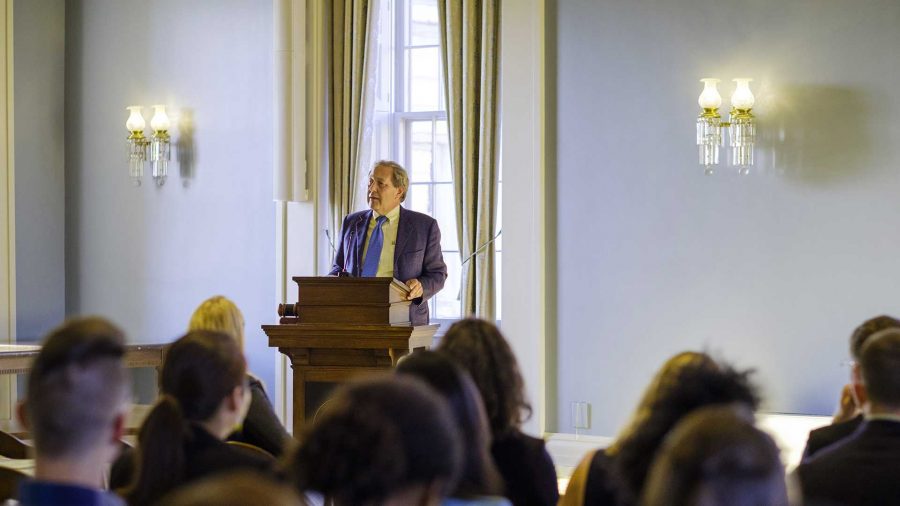Harreld addresses students’ role in shared governance
UI President Bruce Harreld emphasizes the importance of collaboration with student leaders at a joint student government meeting Tuesday night.
University President Bruce Harreld adresses members of the UISG and GPSG on Tuesday, Sept. 19, 2017. Harreld spoke about the need for cooperation between student leaders and administrators as well as the challenges faced by the university following budget cuts by the state legislature. (Nick Rohlman/The Daily Iowan)
September 20, 2017
Campus shared-governance leaders agree the institution is better off when there is more collaboration.
At a joint student-government meeting Tuesday night in the Old Capitol Senate Chamber, University of Iowa President Bruce Harreld and both student government presidents addressed issues facing campus and the importance of collaboration.
“Bringing all of us together and increasing collaboration will be a win-win for everyone,” Graduate and Professional Student Government President Tejasvi Sharma said.
Harreld said the UI administration views the student leaders as important parts of the shared governance process.
“You’re not only students; you’re not only the reason why we are here as an institution … we actually view you as very important parts of our governance process,” Harreld said. “In that context, I think we need to continue to remind ourselves that the more team oriented and collaborative we are, the better off we’ll all be.”
In working with the student leaders, Harreld said he believes being transparent and sharing data will help the branches of shared governance stay together as a team.
“We are large, we are complex, and I think the diversity of opinions, perspectives on all sorts of issues warrant us coming together as a group and having those conversations, sharing data,” he said.
Part of Harreld’s approach to these types of issues, he said, involves thinking about the institution in the long term and what the UI aims to accomplish as well as where it is currently at.
By embracing the campus’ identity and maintaining a vision for the UI in the future, UI Student Government President Jacob Simpson said campus partners, alongside students, have achieved progress on issues such as providing accessible mental-health treatment and dedicating resources toward diversity and inclusion efforts.
Though progress has been made, all acknowledged that there is still much work to be done.
External pressures — one being the nationwide trend of states disinvesting in higher education — remain an obstacle, Simpson said. While it requires attention, he said it cannot distract from the internal challenges the UI faces or prevent the UI from seeking opportunities to affect positive change.
“As leaders of a higher-education public institution, we have a moral duty to encourage and support students to pursue a college degree at the University of Iowa,” he said.
Harreld said he, too, is frustrated by the funding situation, and he is doing everything he can to provide some certainty on the issues.
“We’ll see how this plays out, but I think we also need to fully anticipate that we will not get all the resources we need from the state or from tuition, and therefore we need to prepare ourselves for Plan B,” he said. “I don’t think hope is a viable strategy … so we need to prepare for the consequences that we may not get all the resources we need to support various constituencies on campus.”
RELATED: UI community says regents, UI officials, legislators need to ramp up advocacy efforts
As the uncertainty regarding sufficient state funding continues, Simpson said the UI needs to keep in mind the financial burden students face as they pursue a college degree.
“We must hold ourselves accountable to these principles and realize the impact tuition increases have on all students, especially first-generation, historically marginalized and underrepresented students,” he said.
Both student leaders stressed the need for a safe and inclusive campus and support for programs that work toward creating that kind of environment.
“We will continue advocating for a safer, more inclusive campus,” Sharma said. “We will continue to promote tools such as implicit bias training … we’ve heard and seen the difference it makes, especially for those of us who become teaching assistants.”
Simpson said one of the key areas UISG plans to focus on this year is equity and inclusion.
“Each student brings their own unique identity to our community,” Simpson said. “Diversity, experiences, and knowledge is what enriches our university and makes us stronger.”
RELATED: UI stresses diversity, inclusiveness
Some specific actions to work toward being more inclusive and equal that Simpson highlighted included increasing cultural competency training and advocating for a diversity and inclusion as a general-education requirement in all colleges.
Both student government presidents pledged to advocate for their constituents to legislators, administrators, and local government on all the issues currently facing both the UI’s campus and higher education as a whole.



